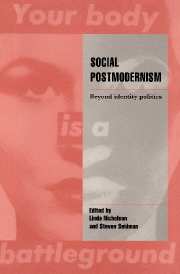Book contents
- Frontmatter
- Contents
- Notes on contributors
- Acknowledgements
- Introduction
- Part I Critiques of identity
- Part II Critiques of the deconstruction of identity
- Part III Postmodern approaches to the social
- 7 Gender as seriality: thinking about women as a social collective
- 8 Refiguring social space
- 9 Just framing: ethnicities and racisms in a “postmodern” framework
- 10 Politics, culture, and the public sphere: toward a postmodern conception
- Part IV Postmodern approaches to the political
9 - Just framing: ethnicities and racisms in a “postmodern” framework
Published online by Cambridge University Press: 29 October 2009
- Frontmatter
- Contents
- Notes on contributors
- Acknowledgements
- Introduction
- Part I Critiques of identity
- Part II Critiques of the deconstruction of identity
- Part III Postmodern approaches to the social
- 7 Gender as seriality: thinking about women as a social collective
- 8 Refiguring social space
- 9 Just framing: ethnicities and racisms in a “postmodern” framework
- 10 Politics, culture, and the public sphere: toward a postmodern conception
- Part IV Postmodern approaches to the political
Summary
Introduction
What I propose to do in this essay is to posit a “postmodern” frame, in order to provide a particular “take” on issues around racism and ethnicity. By placing the term “postmodern” consistently in quotation marks, I am registering reservations about its distinctiveness and indicating a provisionality about its usage and usefulness which are discussed at length elsewhere (Rattansi 1994).
The “postmodern” frame
My construction of the “postmodern” frame draws eclectically upon a wide range of authors-Foucault (1977,1979,1980), Derrida (1977,1978, 1981), Bauman (1989, 1991), Laclau (1990), Giddens (1990a, 1990b), Butler (1990), Hekman (1990), Said (1978, 1993), Hall (1992a, 1992b, 1992c, 1992d), and Bhabha (1983, 1986), among others (see Rattansi 1994).
The following features of a “postmodern” frame as an analytic device are highlighted, and their implications explored, in the understanding of questions of racism and ethnicity:
The “postmodern” condition as primarily an intellectual condition characterized by reflection on the nature and limits of Western modernity.
“Modernity” as a theoretical category: the form of conceptualization adopted here focuses especially on the dualities of modernity; for example, between the formation of democratic institutions and disciplinary complexes of bureaucracy and power/knowledge; between the excitement of rapid change and the simultaneous anxiety of societies seemingly out of control; and the constant destabilization of identities and continuous reinvention of “traditions.”
[…]
- Type
- Chapter
- Information
- Social PostmodernismBeyond Identity Politics, pp. 250 - 286Publisher: Cambridge University PressPrint publication year: 1995
- 21
- Cited by



